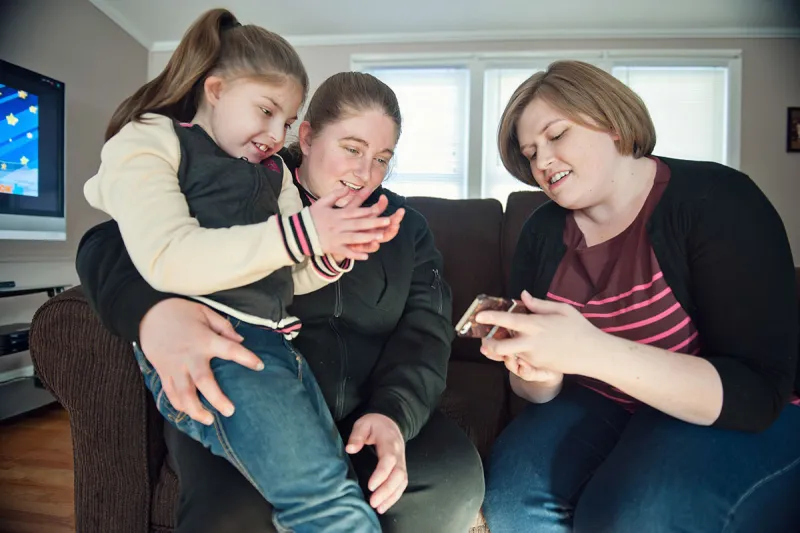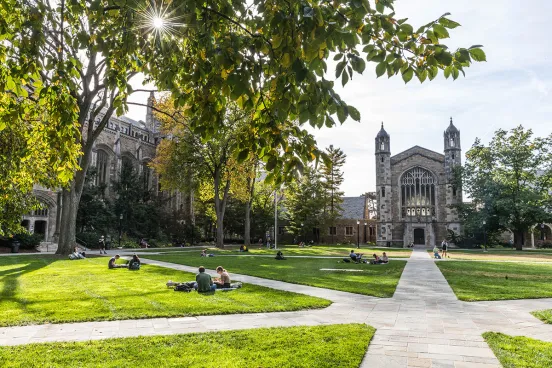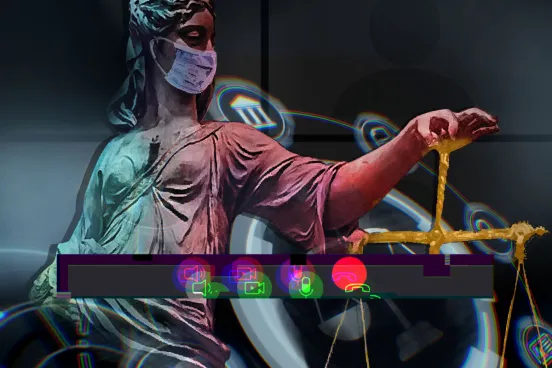Medical-legal partnerships, such as the Pediatric Advocacy Clinic at Michigan Law, address the social conditions that affect the health and well-being of people and communities. Says Clinic Director Debra Chopp: “The idea is that the legal clinic becomes part of the medical team. We’re all working together to improve the health of the child.”
Chrystal Zuniga recalls a time, not long ago, when her daughter could say mom. “It was nice,” she says. “But now it’s just not there anymore.”
Her daughter, Savannah, is 8 years old and has Rett Syndrome, a neurological disorder, as well as DiGeorge Syndrome, a chromosomal disorder that affects her internal organs. Each condition is rare on its own, and the combination is even less common—with odds of about 1 in 34 million for a girl.
Chrystal lists what her daughter can do: grunt to communicate, eat with her hands and sometimes a spoon, stand, turn on Mickey Mouse Clubhouse, crawl, stand on her head. And she talks about what Savannah can’t do: play with toys, say words, eat with a fork or knife, get dressed, climb stairs without a railing, use a toilet. Large blood vessels were wrapped around her esophagus when she was born; this was repaired when she was 4, but she still has had some difficulty with swallowing, making it hard for her to gain weight. “I pretty much take care of her 24/7,” Chrystal says while sitting next to Savannah on a couch at their house in Jackson, Michigan.

Savannah bounds up suddenly and then crawls across the hardwood floors. Her younger sister has left a door open, and open doors are intolerable for Savannah. She closes it, walks back, and sits next to her mother, seeming slightly calmer.
The job of caring for Savannah is exhausting, to be sure, but the situation was made far more frustrating for Chrystal in the past year and a half. Savannah was doing better—or, at least, not regressing as quickly—thanks to speech, occupational, and physical therapies. She could hold objects with greater ease, she generally walked rather than crawled, she could make more sounds than just “eh.”
Then her Medicaid managed care plan began denying coverage of those treatments. She was still receiving some therapies at school, but not as much as her pediatrician, Dr. Joseph Zickafoose at the U-M Health System, thought she needed. “They were using criteria to deny coverage that are used for adults but that should not be applied to children,” Zickafoose says. He and his staff appealed, to no avail. “I was incredibly frustrated.”
Zickafoose knew the family needed help of another kind. He told Chrystal to call a lawyer.
Medical-Legal Partnerships
Specifically, he put her in touch with the Pediatric Advocacy Clinic (PAC) at the Law School. The clinic is what is known as a medical-legal partnership; the faculty members and student attorneys work with health care providers and social workers to advocate for children’s health and well-being-usually children from low-income families who may not otherwise be able to afford an attorney.
PAC, which started 10 years ago, partners with Mott Children’s Hospital at the U-M Health System, the Corner Health Center in Ypsilanti, the U-M Ypsilanti Health Center, and the Washtenaw County Public Health Maternal Infant Health Program. The faculty and student attorneys work together with the U-M School of Social Work and the U-M Medical School.
The clinic only takes civil cases. Some involve family law—domestic violence, divorce, or guardianship cases, for instance; many involve students not getting the special education services and accommodations they need at school; other cases address the denial of Medicaid or other benefits.
“The idea is that the legal clinic becomes part of the medical team. We’re all working together to improve the health of the child and reduce stress on the family,” says Debra Chopp, director of PAC and a clinical assistant professor of law. “To get the holistic care that children need, sometimes a legal intervention is necessary.”
Medical-legal partnerships have been established in 262 health care institutions in 36 states, according to the National Center for Medical-Legal Partnership (NCMLP) at The George Washington University. Many of the social conditions they address are a result of a denial of services and benefits that are designed to help vulnerable people. Some cases are landlord-tenant disputes involving people who live in housing with mold or rodents, which can lead to or exacerbate asthma and other illnesses. Others involve seniors who are denied access to long-term care or domestic violence victims whose health and safety—and that of their family—is affected by abuse.
“These social determinants of health all constitute health-harming legal needs,” says Joel Teitelbaum, co-principal investigator of NCMLP, “and they cannot be treated effectively without some level of legal care. Research has shown that one in six people needs legal care to be healthy, so the integrated medical-legal approach is critical to helping the most vulnerable Americans get and stay healthy.”
Awareness of PAC is high among social workers at the clinic’s partner facilities, Chopp says, but many physicians remain unaware of its services and medical-legal partnerships in general. That’s why Zickafoose recently asked his supervisor to invite lawyers from the clinic to speak with all of the primary-care pediatricians at U-M so they can learn about its services.
“Medical-legal partnerships are something that very forward-thinking folks in law and medicine have been working on for a number of years, and I know that they can benefit many of our patients,” he says.
Life, Death, and the Law
Some of PAC’s cases involve life-or-death issues, such as Daniel Dobrowolski’s case. Daniel is 20 years old and has severe Hunter Syndrome, a genetic disorder that causes permanent, progressive damage. The condition affects a person’s appearance, mental development, organ function, and physical abilities. Daniel is in a wheelchair; he does not speak, and it is unclear if he understands when others speak to him. He weighs only 75 pounds.
“We first started noticing something at age 2 and a half when he wasn’t talking like his older brothers had at that age,” said Kathy Dobrowolski, Daniel’s mother. Shortly thereafter, he was diagnosed by a geneticist. Daniel went through a phase when he was hyperactive and would walk to neighbors’ homes and ring their doorbells, and sometimes walk right in. He often stayed up all night. Then a series of health problems, including the collapse of his left lung at age 4, resulted in a significant reduction in Daniel’s activity level.
“We agreed early on that we would take it one day at a time and not feel sorry for ourselves, or for Daniel,” said Paul Dobrowolski, Daniel’s father.
As the years went on, Daniel’s health deteriorated. His facial features thickened, he lost much of his hearing and vision, and his breathing became more labored. He stopped growing. His facial expressions still suggest whether he likes or dislikes something. But he is non-verbal, and he is estimated to be between six months and 1 year old cognitively. Still, thanks to special-education laws, Daniel is able to attend High Point, a public school operated by the Washtenaw County Intermediate School District. He began there in 2003 and can continue to attend until he turns 26.
“He does an amazing amount of work at school,” Kathy said. He uses a computer with the help of a large button that he can press when a staff member’s hand is over his. He makes art projects such as handprint wreaths and gifts for Father’s Day and Mother’s Day, and he even swims.
The family loves the school—”we’re blessed to have High Point in Michigan,” Paul said—so it was especially difficult when Paul and Kathy were told that the school district would not honor their do-not-resuscitate (DNR) order for Daniel.
The family had worked with Daniel’s palliative care team at U-M’s Mott Children’s Hospital to formulate a DNR for him. His physician said that Daniel would not feel pain if his heart stopped naturally, but he would if someone tried to resuscitate him. Paul and Kathy challenged the school district’s position not to honor the DNR, but to no avail. “We were at a loss as to whether this was something you need a lawyer for,” Kathy said. A member of the palliative care team suggested they contact PAC.
The clinic took on the Dobrowolskis’ case. Last summer, student attorney Amanda Merkwae, a 2L, presented the case before the Hon. David S. Swartz, chief judge of the trial court and presiding judge of the civil/criminal division in Washtenaw County.
The right of Daniel’s guardians should supersede that of the school district, Merkwae argued. She said the DNR only prevented three things: use of a defibrillator, chest compressions, and cardiac medications. Daniel, she said, should be allowed to experience “peaceful and painless final moments.”
The school district’s attorney said that, in the narrow window of time when the school staff members would treat Daniel before paramedics arrived, they wouldn’t have the tools to determine if his heart had stopped naturally. He also pointed out how traumatic it would be for the students and staff at the school if Daniel were to die there.
Merkwae countered that the staff can and should still respond to Daniel if he needs help at school—by positioning him, suctioning his trach tube, providing oxygen, and generally comforting him. “The school district’s policy on the whole is not reasonable,” she said. Judge Swartz would not make a ruling about the policy as a whole that day, but in Daniel’s case, he said, “there is absolutely no question” that the school district should respect the DNR.
Outside the courtroom, Merkwae received congratulations from Paul and Kathy, as well as L. Kate Mitchell, PAC’s clinical teaching fellow. “Most veteran attorneys could not have done as well as you just did,” Mitchell said. One of the school district’s attorneys said “wow” upon hearing that Merkwae was just a 2L.
“I don’t know where we would be without them,” Kathy said of the PAC legal team.
A few months later, Paul and Kathy sat at their home in Saline, Michigan, talking about Daniel and the case. They still love High Point, and they have had good conversations with staff members there since the court ruling. “It was a learning experience for everyone as to what the DNR would entail,” Kathy said. “We know that everyone, from the principal on down, truly want what is best for Daniel.”
Daniel, meanwhile, sat nearby in his wheelchair. Paul arose periodically to suction his son’s trach tube. Kathy and Paul are very aware that they are lucky to have had as much time with Daniel as they have. Life expectancy usually is in the mid-teens, they say, and Daniel already has lived beyond that.
“Daniel is still teaching us a lot about life. He still gives us a lot of love, and he draws the love out of us,” Paul said. But when it is Daniel’s time to go, he said, “we just don’t want him to suffer.”
Hope for Savannah
Back in Jackson, student attorney Annalyce Shufelt, 3L, explained to Chrystal the meaning of a letter they received from the state Department of Community Health. At first, Chrystal seemed unwilling to believe the good news—and, really, who can blame her?
First, she faced the denials of coverage from Savannah’s Medicaid managed care plan. Then, Dr. Zickafoose unsuccessfully appealed the decision. “I thought of giving up,” Chrystal said. PAC got involved and was granted an administrative fair hearing. The clinic’s attorneys explained to the administrative law judge that the standard used in the denials of coverage should be applied only to adults.
The rejections were based on the adult standard that therapies would not be covered if they were “habilitative”—that is, teaching someone to perform a task or skill for the first time. Using that rationale, Shufelt said, “If you are 2 years old and can’t walk, you will never qualify for physical therapy. In what world does that make sense?”
PAC attorneys argued that Savannah’s care should be covered under the federally mandated Early Periodic Screening, Diagnosis, and Treatment (EPSDT) Program, which requires coverage of a wide range of medical services for children enrolled in Medicaid in order to prevent conditions and disabilities from worsening due to lack of care. Medical necessity should be the only standard for coverage of treatment, they argued.
The administrative judge had not heard of EPSDT, Shufelt said, so the attorneys wrote a brief about it. During the hearing, Shufelt conducted a blind cross examination of an unexpected medical expert. “Did you assess Savannah using medical necessity as the standard?” she asked. He said he hadn’t. Yet they still lost, and the judge did not mention EPSDT in her ruling.
Meanwhile, the clinic worked with Savannah’s school to get additional therapies for her there, including a boost of her speech therapy from 15 minutes a week to 30 minutes. But the school’s resources are limited, Shufelt said, and significantly more therapy was necessary.
In regard to the Medicaid coverage, “We weren’t sure what to do: appeal in circuit court in Michigan or go on the path to a federal lawsuit,” Shufelt said. In determining the strategy, clinical teaching fellow Mitchell said, PAC took an “upstream approach”—that is, analyzing the case to identify the root of the problem and determining strategies that can fix the problem at its source.
“A specialist in the Zuniga case indicated that the issues that Savannah was experiencing were pervasive after recent changes to the provision of Medicaid coverage to children with chronic medical conditions in Michigan, so we knew to think about the case more systemically,” Mitchell said. “Instead of appealing the case to circuit court so we could get a remedy just for Savannah, we chose an approach that could fix the coverage issues for all similarly situated children in Michigan.”
The clinic made a direct appeal to the state agency that oversees Medicaid with a letter to the Department of Community Health in November. Chrystal, meanwhile, looked into paying for therapy herself, but the cheapest she found was $35 per session for three sessions a week, which she could not afford.
Good news arrived in January, when a letter from the Department of Community Health was delivered to PAC. “We agree that the services in question are medically necessary and therefore fall under the [EPSDT] program requirements for Medicaid beneficiaries under the age of 21 years,” the letter said. The letter also said that the department would add information to its EPSDT toolkit that describes the federal requirements, and that the department would send a copy of the letter to the Michigan Administrative Hearing System so that administrative law judges could gain an understanding of the EPSDT requirement.
Shufelt was ecstatic—both that Savannah’s care would be covered, and that their efforts might affect more children. “We don’t want this to happen to any other kids,” Shufelt said. “We want the standard in Michigan to be changed so that it is compatible with federal law.”
Chrystal took Savannah for medical evaluations in February, and the recommendation was for occupational, physical, and speech therapies three times a week. She remained circumspect about the chances that the therapies would be covered by Savannah’s Medicaid plan. But she also allowed herself a bit of guarded optimism.
“I hope she gets the therapy she needs. I hope she will up her strength and be able to move around better, and maybe even to talk again,” Chrystal said. “I hope so.”
Epilogue
Savannah’s treatments have been approved for coverage. Additionally, a new statement has been inserted into each outpatient therapy section in the Medicaid Policy Manual in Michigan. It says, “Note: Federal EPSDT regulations require coverage of medically necessary treatment for children under 21 years of age, including medically necessary habilitative therapy services.”






![The Tech [R]evolution in Law The Tech [R]evolution in Law](/sites/default/files/styles/teaser/public/2023-03/The-Tech-%5BR%5Devolution-in-Law.jpg.webp?itok=Obrll94p)
